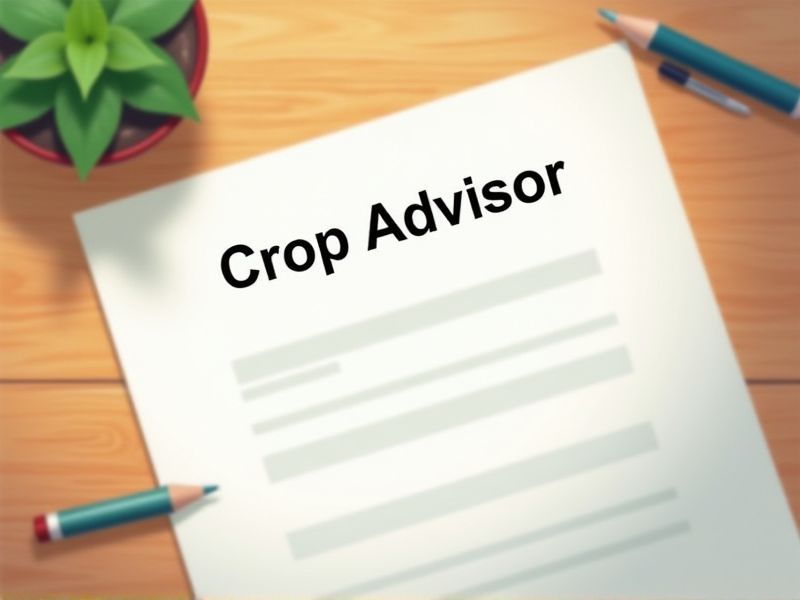
A crop advisor plays a crucial role in guiding farmers toward sustainable and efficient agricultural practices, directly impacting crop yields and quality. Certifications ensure that crop advisors possess the necessary expertise in pest management, soil health, and agronomy, which translates to more informed decision-making. Certified advisors also build credibility with clients and enhance the trust and reliability of their services. Here are some essential certifications you may need as a Crop Advisor.
Certified Crop Adviser (CCA)
Certified Crop Advisers (CCAs) are essential for crop advisors because they ensure adherence to industry standards through verified expertise in agronomic and environmental practices. The CCA program provides rigorous training and evaluation, enabling advisors to implement scientifically-backed strategies. This certification acts as a benchmark for quality, fostering trust among farmers and stakeholders. The presence of CCAs enhances sustainability by integrating knowledge on soil health, pest management, and resource efficiency.
Certified Professional Agronomist (CPAg)
Certified Professional Agronomists (CPAg) bring expert knowledge in soil management, which directly improves crop productivity. Their expertise in integrated pest management helps reduce crop loss and minimize environmental impact. CPAgs provide evidence-based recommendations, ensuring efficient use of resources and increased yield. Their certification reflects a commitment to ongoing education, keeping them updated on the latest agronomic research and practices.
Pesticide Applicator License
A pesticide applicator license ensures that crop advisors are properly educated on the safe and effective use of pesticides, which minimizes harm to the environment and non-target organisms. Crop advisors with such a license demonstrate proficiency in understanding pesticide regulations, crucial for legal compliance and professional accountability. Properly licensed advisors can optimize pest control strategies, leading to increased crop yields and reduced economic losses for farmers. Possessing this license indicates a commitment to ongoing education and adherence to industry standards in agricultural practice.
Integrated Pest Management (IPM) Certification
Integrated Pest Management (IPM) Certification is necessary for Crop Advisors because it equips them with advanced strategies to manage pests effectively, reducing reliance on chemical pesticides. This certification ensures advisors are knowledgeable about sustainable practices, increasing crop yield and quality by controlling pest populations responsibly. With IPM training, advisors can provide evidence-based recommendations that minimize environmental impact and protect natural ecosystems. By having this certification, they gain credibility and trust among farmers and stakeholders, leading to more successful agricultural outcomes.
Soil Science Certification
Certified crop advisors with a soil science certification possess validated expertise in soil management and agronomy practices, essential for optimal crop yield. Accurate soil assessment ensures nutrient balance and prevents over-reliance on chemical fertilizers, leading to sustainable farming. Knowledge in soil microbiology helps advisors recommend practices that enhance soil health and biodiversity. Understanding soil properties enables tailored advice for erosion control, directly impacting farm productivity and environmental protection.
Fertilizer Management Certification
Fertilizer Management Certification equips crop advisors with knowledge of nutrient application best practices, enhancing crop yield and quality. Proper certification ensures adherence to environmental regulations, reducing the risk of runoff and contamination. It enhances advisors' credibility, fostering trust among farmers and stakeholders. Certified advisors contribute to sustainable agriculture by optimizing fertilizer use, minimizing costs, and maximizing resource efficiency.
Precision Agriculture Certification
Precision Agriculture Certification ensures that crop advisors have the necessary skills to implement advanced agricultural technologies effectively. This certification enables advisors to provide more accurate recommendations, leading to increased crop yields and reduced resource wastage. Certification also enhances trust between crop advisors and farmers, fostering stronger professional relationships. With climate variability and the need for sustainable practices, certified advisors are better equipped to address modern agricultural challenges.
Irrigation Management Certification
Irrigation Management Certification equips crop advisors with the knowledge to optimize water usage, leading to improved crop yields. Mismanaged irrigation often results in water wastage and increased production costs; certified advisors help mitigate these issues. Proper certification ensures advisors stay updated on the latest technologies and practices, enhancing resource efficiency. Certification also instills trust among farmers and stakeholders, demonstrating the advisor's commitment to sustainable agriculture.
Sustainable Agriculture Certification
Sustainable Agriculture Certification equips crop advisors with scientifically-backed knowledge essential for promoting eco-friendly farming methods. It demonstrates to stakeholders that the advisor is proficient in sustainable practices, boosting their credibility and trustworthiness. Certification helps ensure compliance with environmental regulations, mitigating risks associated with harmful agricultural practices. As consumer demand for sustainably produced food increases, certified advisors can better guide farmers to meet market demands and enhance profitability.
Agricultural Business Management Certification
Agricultural business management certification equips crop advisors with advanced knowledge on efficient resource allocation, enabling them to improve farm profitability. Understanding market trends and financial analysis becomes crucial, as it directly impacts decision-making and risk management in farming operations. This certification helps in mastering integrated pest management strategies, essential for sustainable agricultural practices and optimal crop yields. As climate change intensifies, expertise in business management is necessary for advising on adaptive strategies that maintain crop resilience and economic viability.
Summary
When you gain certifications as a Crop Advisor, your credibility among farmers significantly increases. This enhanced trust often leads to more clients seeking your expertise, boosting your professional network. Your updated knowledge can help in efficiently addressing complex agricultural issues, resulting in improved crop yields. The overall impact is a potential rise in your career opportunities and reputation in the agricultural sector.
